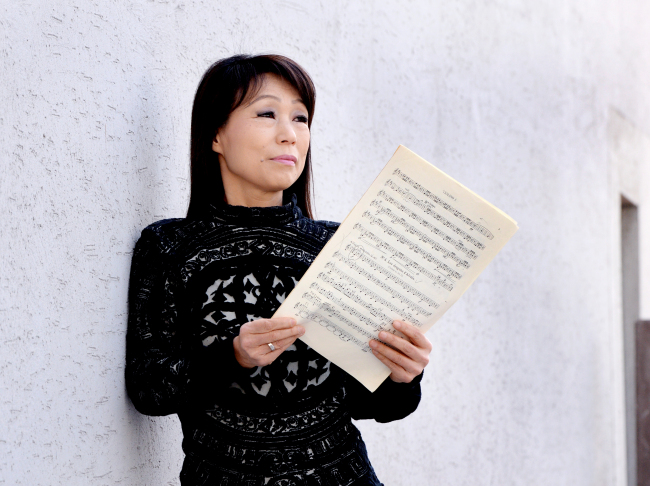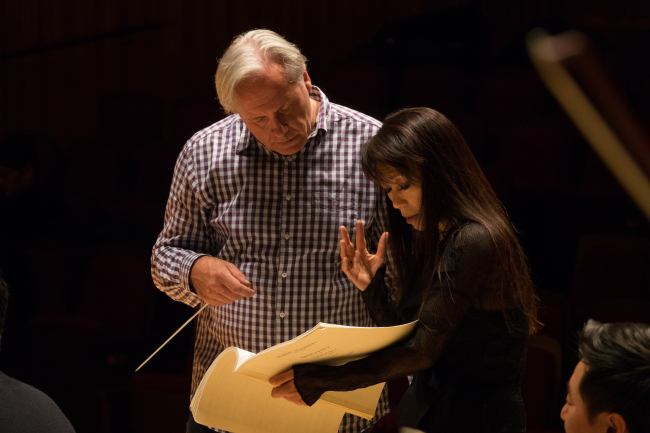[Eye] Making sense of modern music
Composer Unsuk Chin urges people not to shut out contemporary music, vows to speak out on SPO controversies
By Korea HeraldPublished : March 24, 2017 - 15:36
Dressed head to toe in black, with her dark black hair worn long and eyes done in her signature dark smoky look, Unsuk Chin is a force majeure.
Although her name may not be well-known here, classical music fans know her as the composer-in-residence of the Seoul Philharmonic Orchestra and, since last year, also the orchestra’s artistic adviser.
“I thought about quitting after Chung Myung-whun left,” Chin said during an interview on March 8 at her office at Sejong Center in downtown Seoul. Maestro Chung left the SPO at the end of 2015, after serving 10 years as its music director, amid a maelstrom of controversy surrounding the orchestra.
“However, I realized that the orchestra was facing a grave crisis. I decided to postpone my decision on whether I would leave,” she said.
The last few years have certainly been dramatic for the SPO. Its troubles began in December 2014 when a number of employees claimed sexual harassment and verbal abuse by SPO CEO Park Hyun-jung.
Park denied the accusations but resigned later that month. However, the police in August 2015 found the accusations against Park groundless. In December that year, the police charged Chung’s wife with ordering the dissemination of falsehood. Things grew murkier in March 2016 when the police charged 10 SPO employees with the dissemination of falsehood and sent their cases to prosecutors. That same month, Park sued Chung for defamation, to which Chung responded with a countersuit. In February, Park sued three SPO employees for false accusations.
Although her name may not be well-known here, classical music fans know her as the composer-in-residence of the Seoul Philharmonic Orchestra and, since last year, also the orchestra’s artistic adviser.
“I thought about quitting after Chung Myung-whun left,” Chin said during an interview on March 8 at her office at Sejong Center in downtown Seoul. Maestro Chung left the SPO at the end of 2015, after serving 10 years as its music director, amid a maelstrom of controversy surrounding the orchestra.
“However, I realized that the orchestra was facing a grave crisis. I decided to postpone my decision on whether I would leave,” she said.
The last few years have certainly been dramatic for the SPO. Its troubles began in December 2014 when a number of employees claimed sexual harassment and verbal abuse by SPO CEO Park Hyun-jung.
Park denied the accusations but resigned later that month. However, the police in August 2015 found the accusations against Park groundless. In December that year, the police charged Chung’s wife with ordering the dissemination of falsehood. Things grew murkier in March 2016 when the police charged 10 SPO employees with the dissemination of falsehood and sent their cases to prosecutors. That same month, Park sued Chung for defamation, to which Chung responded with a countersuit. In February, Park sued three SPO employees for false accusations.

Chin felt conflicted by the situation she faced. “Musically, I needed to take on the artistic adviser post,” she said. “It was actually a good opportunity. I could add my ideas, colors to the orchestra.”
As the SPO’s composer-in-residence, a post she has held since 2006, Chin organizes four Ars Nova concerts a year -- concerts that are dedicated exclusively to contemporary classical music. For the second concert in this year’s Ars Nova series, to be held April 1 at the Lotte Concert Hall, Pascal Rophe will conduct the SPO in the performance of Paik Byung-dong’s “Hae-Jo-Eum for Orchestra,” Dukas’ “Fanfare pour Preceder La Peri” and the Korean premiere of Lachenmann’s “Tableau for Orchestra,” among others
“It is very difficult, but a rewarding and learning experience,” Chin said about her work with the SPO. On the other hand, political issues remain, she said, noting that “this burden has become much heavier.”
Chin said she has held her tongue, refraining from talking about the ongoing controversy at the SPO because she is involved in it. But she is ready to speak out, Chin said, adding that it would be ridiculous to discuss music without talking about the overriding issue that the SPO faces.
Chin expressed dissatisfaction at the SPO’s handling of the controversy: It failed to respond promptly and gave out no information about it. “We should be able to raise issues, but in a positive, constructive manner. There should be a productive discussion,” she said.

What do SPO’s current troubles mean for its future? It is still searching for a new music director and has in the meantime signed on two conductors -- Markus Stenz as conductor-in-residence and Thierry Fischer as principal guest conductor -- for three years.
Finding a new music director will prove difficult. It is most likely that someone from abroad will fill the post and given the fact that troubles at the SPO are well known, he or she might be hesitant to sign up for the job. “I don’t think anyone will really come without a guarantee that there will be no similar problems for him,” Chin said.
Chin has lost 5 kilograms since the troubles began and her health has deteriorated, she said. “I now suffer from insomnia and have health problems, too,” she said.
“I am staying because I think I must help,” Chin said. “It is vital that the orchestra be able to improve is credibility,” Chin said.
As for Chin’s own work as an award-winning composer, her involvement with the SPO seems to be all consuming. She even missed the performance of her own work by the BBC National Orchestra of Wales, she said. In the 2018/2019 season, The Royal Opera in London will premiere Chin’s second opera, “Alice Through the Looking Glass,” which it commissioned. Based primarily in Europe, it was only in August 2016 when “Le Chant des Enfants des Etoiles” was performed here to mark the opening of the Lotte Concert Hall -- Seoul’s first classical music concert hall to open in nearly three decades -- that any of her work had its world premiere in Korea
“Music is the most difficult to understand among the different arts. And it becomes more difficult as one approaches contemporary times,” she said. This is due to contemporary classical music going to the extremes after World War II. “There is much that is difficult to understand,” she said.
But Chin asks people not to shut out contemporary music. “There is great diversity and there are pieces that can be understood,” she said. Appreciation for contemporary classical music has grown, too, Chin noted. For example, Mahler was rarely performed in Korea in the 1980s; Mahler pieces have now become highly popular with SPO’s Mahler series selling out. “Twenty to 30 years ago, Shostakovich was considered difficult,” she said. “Now people have developed an ear for him,” she said.
After a period of pushing music to the extremes, things have calmed down, Chin noted. Virtually everything has been done, from hitting on piano strings to scratching them -- there is a composition which is 10 minute of pure noise -- leaving little room for further experimentation.
“There is now a new concept of newness. There is a seeking of harmony now,” Chin said, citing Hans Werner Henze, a German composer considered one of the preeminent composers of the 20th century. “You just need to listen to it (contemporary classical music) more often,” she said.
Things have changed since 2006 when the first Ars Nova concert was held: The audience is much more receptive to contemporary music, helped in no small part by Chin’s preconcert talks that act as guide to music appreciation. “We now have regular fans of Ars Nova and some request for more radical pieces,” she said.
By Kim Hoo-ran (khooran@heraldcorp.com)
-
Articles by Korea Herald



















![[Today’s K-pop] Treasure to publish magazine for debut anniversary](http://res.heraldm.com/phpwas/restmb_idxmake.php?idx=642&simg=/content/image/2024/07/26/20240726050551_0.jpg&u=)